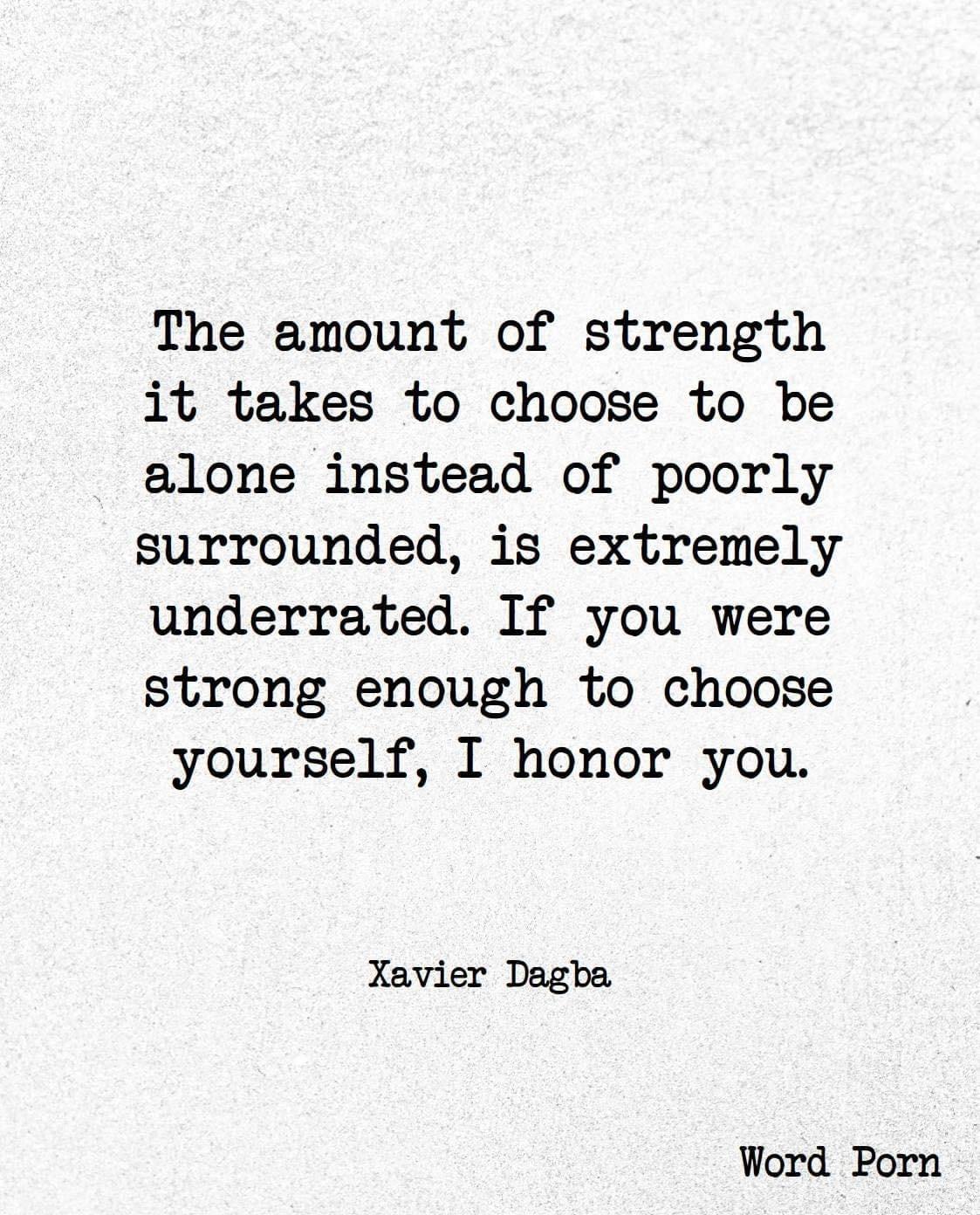
“The amount of strength it takes to choose to be alone instead of poorly surrounded is extremely underrated. If you were strong enough to choose yourself, I honour you.”
- Xavier Dagba
The tendency of autistic people to become detached from society, living lives in isolation from others, is well-known. The bitter irony is that the people who are most in need of social and emotional support can be the ones who are most deprived of it. Some of it is personal idiosyncracy, some of it is problems with socialisation inherent in the condition, some of it is the blank refusal on the part of well-adjust and successfully socialised others to make the slightest changes to accommodate those in need of help. In fine, there are plenty of reasons as to why autistic people end up living alone and most of them involve a conscious choice at all on their part.
Autistic people will tell you of the sadness and frustration they feel when they hear someone say 'he or she prefers to be alone.'
That's how it seems to people who have no idea about autistic experience. The truth is that many and I would suggest most autistic people seek the company of others and make the effort at socialisation, only for problems in communication and interaction to lead to misunderstanding and awkwardness. This happens so often, with autistic people being confronted with the same problems with such depressing frequency as to cause them to cease making the effort. It is at that point that neurotypicals conclude that he or she 'prefers to be alone.' What autistic people actually want is the last thing to be factored into the account.
At some point, facing the same problems that have been faced many times before, the same challenges, the same energy amd hope-sapping requirement to school uncomprehending others, an autistic person may well indeed choose to be alone. It is much better for one's sanity and peace of mind to be alone with one's 'special interests' and little joys and pleasures than to be alone with others who are not remotely on the same wavelength.
Does it take strength to go it alone?
Very probably. But what about courage?
To stop seeking contact with others commits you to a tough life of isolation, without the comfort, support, and reassurance others may offer. It takes strength. It takes strength, too, to put up with the idiocies and irritations of others. Human beings are always much less than perfect; they are the greatest cause of stress on the planet. On balance, though, it is probably worthwhile keeping one or a few of them around in your life, for various useful purposes (if that doesn't sound too instrumental
…)
It takes courage to have faith in others, to trust others, and to place your life in their hands. The fact that faith, hope, and trust is not always rewarded is precisely why courage is needed.
My conclusion is therefore inconclusive. It takes strength and courage to go it alone, it takes strength and courage to join with others. A different kind of strength is involved in both instances.
The one involves a retreat upon oneself as a self-sufficient being closed in on oneself, shutting the world out; the other involves an attempt to expand being outwards in relation to others. The one seeks a certainty that is possible only in the most narrow of terms; the other a greater range of possibilities in conditions of uncertainty. The one seems to be a form of cowardice rather than courage, a resignation, a surrender of hope, a retreat in acceptance of defeat; the other a wager that life and people may well turn out to be good after all, all previous evidence to the contrary. Oscar Wilde's view of second marriage could easily describe the autistic person's determination to give people and society one more try: “the triumph of hope over experience.”
At this stage I am feeling very experienced indeed and much less hopeful than I ever was, and I was never too hopeful to begin with. But if you keep pushing tomorrow, one day, perhaps, you may well find that elusive something or someone you have been looking for your entire life - the places, persons, and things you have known since ever, in your dreams. 'If only we could always live in dreams,' as the great Roy Orbison sang:
In dreams we do so many things
We set aside the rules we know
And fly the world so high
In great and shining rings
If only we could always live in dreams
If only we could make of life
What, in dreams, it seems
But in the real world
We must say our goodbyes
- Roy Orbison, "In the Real World."
You can never be disappointed if you have no hope to begin with. But to withold hope is to assume disappointment before the fact, which is really cowardice. It takes more courage to hope than it does to despair, for the very reason that hard facts seem to be ranged against the hopeful and in favour of the despairing.
It takes strength to keep returning to the social ground, having suffered one misfortune and misunderstanding after another. But if it's hard to go it alone, it's much harder to be involved in relationships with toxic others.

